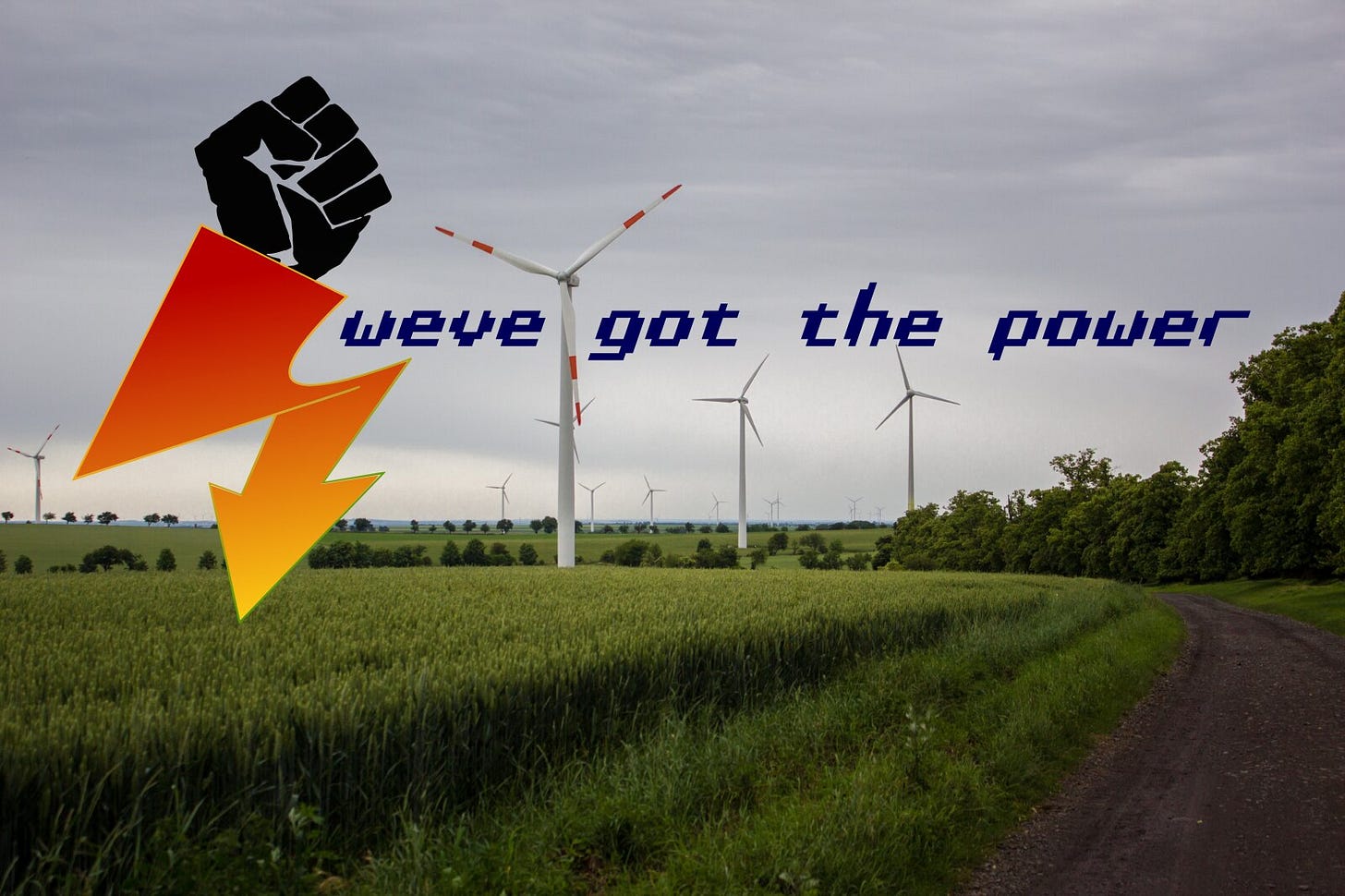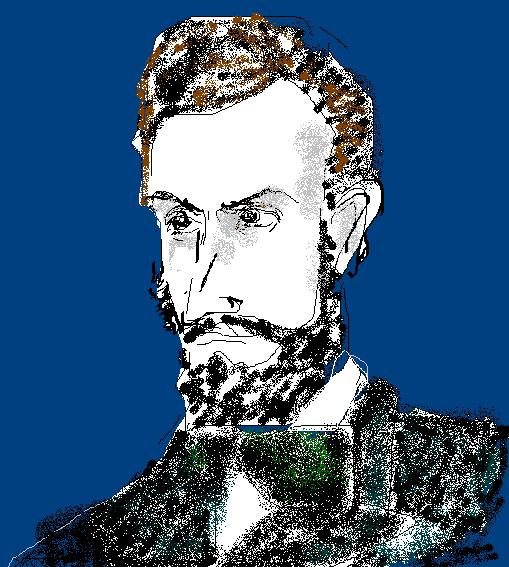Where does the power of community energy come from?
Lessons from the history of anthropology for the future of renewable energy
The future of the electricity grid may well be local. In low-to-middle income countries without universal grid access, alternative electricity-generation technologies (mostly solar) are making their inroads into far-flung communities faster than the national grid can reach them. Countries with well-established universal grids are playing with loopholes in the protections that kept the central monopolies firmly in place, in an interesting combination of market ideology (free competition for everyone!), 1970s ideals of communitarian autonomy, and falling prices of alternative electricity-generation technologies (mostly solar).
Welcome to the age of community energy, where ownership of power generation is (partly) in the shared hands of a locality.

Community energy made in Germany.
Local transitions
Community energy is interesting, because it promises to address core principles of a fast and fair sustainable transition. Being of the people, they’re likely for the people too, spreading some of that green new money around. Being locally grounded, they open up possibilities for ordinary people to get involved and to get a say in the transition. These two benefits may also help speed up the transition, by increasing people’s acceptance of change (and perhaps by putting motivated people behind the wheel).
Still, we are talking mostly promises here. By the same token, they constitute a risky proposition. “Communities” have the annoying habit of harbouring members with diverging interests. What prevents these divergences from crippling resolve, decision-making and just general unity of purpose?
Funny I should ask, because it just so happens that anthropology has a long (if somewhat forgotten) tradition thinking about precisely that question! In fact, we just talked about it this week in our history and theory of anthropology class. So, let’s take a little detour.
Social glue
In The Gift, Marcel Mauss (1872-1950) uncovers the three Laws of Human Sociality: to give, to receive and to return.

Marcel Mauss, according to Wikipedia.
He uncovers these in ethnographic from collected from across the globe, based on the conviction that ‘primitive’ societies could show certain essential qualities of the human condition more purely and clearly than advanced societies. One place in particular where he sees evidence of the Law is in the Melanesian concept of ‘hau’. Hau is the spirit of an object and it will haunt you if you do not reciprocate the gift bestowed upon you. Mauss reads it as a sort of personification of the obligation under which we place ourselves when we enter into exchange with others.
In other words:
Gifts bind people. ‘Debt’ is the universal social glue and our sense of honour is what endows it with its sticking power.
People are social beings through and through. Abstract from that sociality and you end up with the calculating agents you know from your favourite economics text book. We do not live in economics text books. It is why Mauss calls out the economistic notion (peddled by Adam Smith) that ‘barter’ is the foundation of all social exchange. This homo economicus is a creature of fiction. We are not bound by rational interest, but by obligation.
How does this help us to think about community energy?

The most famous gift of all (at least if you’re an anthropologist). A Melanesian Kula bracelet.
There’s more than one way to pay for energy
Let’s start with an article about off-grid solar solutions in rural India that builds directly on an anthropology of exchange. The main researcher provided a female head of household in two villages with a solar installation and some chargeable gear like solar lanterns and power packs. Both household were given complete control and ownership of the assets. Both settled independently on a business model in which they would rent out the gear to their fellow villagers at flat monthly rental fee per month, free top-up charges included.
However, they did not always collect this fee. There were cases where they either preferred in-kind recompense or asked for no payment at all. While cash was highly valued, in-kind payments had their own advantages, for instances in circumventing the market as intermediary or when certain services were necessary anyway. When it came to close relations, the solar entrepreneurs declined asking anything at all. It’s a classic gift paradigm: asking for money would be a capitalist slap in the face, denying the social bonds of reciprocity between them. Those bonds of reciprocity would also ensure that the gifts wouldn’t be a free handout either, because of Law No. 3. At some point, they’d return the favour.

Ways to pay for energy. Photo taken from the article.
Trust in energy communities
Can this article help us understand ‘community energy’ as it is conventionally understood in the literature (i.e., the energy cooperative, or when a power company shares ownership with a locality)? The worlds may be far apart the fundamentals are the same: a private-but-(not yet)-socially embedded actor needs to navigate a social web in order to build a successful product and service.
That process is often framed in the literature as establishing trust. As Kalkbrenner and Roosen observe (2016: 67), trust is crucial in ensuring people’s participation in community energy, to such an extent that other potential motivating factors depend on it. No trust, no dice - whatever else people may want or believe.
So, let’s take a closer look at trust, by quickly (and irreverently) hopping through some of the literature.
Trust can take time. It takes time because reciprocity – giving and returning – takes time. Goedkoop & Devine-Wright’s (2016: 137) research into the practical complications of private-community shared ownership leads them to highlight the importance of two-way communication. Social scientists will always tell you communication is important (something we share with psychologists), but this should help you understand why: you develop a social relationship though joint ventures – and all the (little) exchanges that these imply.
For Goedkoop and Devine-Wright, then, trust is an ‘empirical’ problem. We know it can be built, so we just need to look for when and where. For Yildiz et al’s (2015) review article, infused with the spirit of behavioural economics, trust is a fundamental problem (p 69). In a world of self-interested individuals, what is the basis of trust? Solving that problem by institutionalizing ‘self-interest’ through market exchange can be counterproductive though, leading to “transaction costs” (66) that other forms of exchange might avoid (see Singh et al 2018: 204f. for an ethnographic example).
Lehtonen & De Carlo (2019: 6) offer an example of the problematic role of markets in communities. One Brighton (UK) cooperative was accused of being in ‘competition mode’, failing to cooperate with other cooperatives and citizens in the area. To its own mind, the cooperative was just trying to get as many solar panels installed as possible, but the criticism revealed that it was acting more like a market-oriented actor, like it was ‘competing’. Too much market, too little reciprocity.
They conclude:
Our exploratory analysis [shows] the fragility, uncertainty and context-dependence of the benefits of [community energy] to social cohesion and social capital. (p 7)
Berka & Creamer (2018: 3408) reach similar conclusions in their extensive review of the social and environmental impacts of community energy. While starting out with stronger trust makes it likely you’ll end up with more of it in the end (and the reverse), you can never be sure of it, and assessments of trust themselves are contentious. In other words, trust is tenuous, and its (distributive and participatory) conditions need to be recalibrated again and again.
Conclusion
Singh et al observe that most studies of ‘peer-to-peer’ exchanges conceive them as strictly market exchanges (p 195). Such conceptions will structure cooperatives, microgrids and other energy sharing solutions to come, which is just one of the ways our myth of homo economicus keeps pervading into the minute details of our lives. Now, rational choice market models aren’t completely irrelevant; they are just bad points to start with. They’re also a tragic point to start with, because they can be self-fulfilling.

Man is social. From undraw.co.
That doesn’t mean that sharing and caring is the future. Actual reciprocity comes with the burden of real social relationships. The market can be liberating, freeing people from social obligations (and thus, social control). Yet, markets can also be bleak and oppressively inflexible, so for our energy future one would wish some of the leeway that Singh et al’s one-woman energy providers had – the freedom to choose with whom you want to exchange on exclusively market terms, and with whom you want to exchange with more substantive in-kind or delayed, general reciprocity. That freedom may be one of the keys ways trust can flourish. I’ll end with their call to action:
more research is needed to design and develop novel mechanisms that facilitate payments using different types of [payments], incorporate a range of quantitative and qualitative calculations, various scales of commensuration, and importantly are not limited to the market-logic by enabling people to use diverse logics of their social spheres. (p 211)
This is the second edition in a series where I revisit classical anthropological theory in order to shine a different light on (the social science of) energy transitions. Thanks for sticking with me till the end, my quest for brevity continues.
Sources
Berka, Anna L., and Emily Creamer. 2018. "Taking stock of the local impacts of community owned renewable energy: A review and research agenda". Renewable & Sustainable Energy Reviews. 82 (P3): 3400-3419. http://dx.doi.org/10.1016/j.rser.2017.10.050
Goedkoop, Fleur, and Patrick Devine-Wright. 2016. "Partnership or placation? the role of trust and justice in the shared ownership of renewable energy projects". Energy Research and Social Science. 17: 135-146. https://dx.doi.org/10.1016/j.erss.2016.04.021
Kalkbrenner, Bernhard J., and Jutta Roosen. 2016. "Citizens’ willingness to participate in local renewable energy projects: The role of community and trust in Germany". Energy Research & Social Science. 13: 60-70. https://dx.doi.org/10.1016/j.erss.2015.12.006
Lehtonen, Markku, and Laurence de Carlo. 2019. "Community energy and the virtues of mistrust and distrust: Lessons from Brighton and Hove energy cooperatives". Ecological Economics. 164. https://doi.org/10.1016/j.ecolecon.2019.106367
Singh, A., Alex T. Strating, N.A. Romero Herrera, Debotosh Mahato, D.V. Keyson, and Hylke W. van Dijk. 2018. "Exploring peer-to-peer returns in off-grid renewable energy systems in rural India: An anthropological perspective on local energy sharing and trading". Energy Research and Social Science. 46. https://doi.org/10.1016/j.erss.2018.07.021 (open access)
Yildiz, Özgür, Jens Rommel, Sarah Debor, Lars Holstenkamp, Franziska Mey, Jakob R. Müller, Jörg Radtke, and Judith Rognli. 2015. "Renewable energy cooperatives as gatekeepers or facilitators? Recent developments in Germany and a multidisciplinary research agenda". Energy Research & Social Science. 6: 59-73. http://dx.doi.org/10.1016/j.erss.2014.12.001
Full disclosure: I am happy to count Anna Berka and Alex Strating among my acquaintances, though sadly neither of them sponsored this issue.
PS: If you do not have the appropriate credentials to cross the paywall to these articles, maybe you can check out https://sci-hub.tw (just copy paste in the doi number), or if you are uncomfortable with that, send me a message and I’ll lend you a copy.
